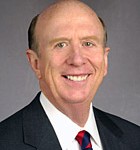THE WHITE HOUSE
Office of the Press Secretary
For Immediate Release March 22, 2012
March 22, 2012
MEMORANDUM FOR THE HEADS OF EXECUTIVE DEPARTMENTS AND AGENCIES
SUBJECT: Expediting Review of Pipeline Projects from Cushing, Oklahoma, to Port Arthur, Texas, and Other Domestic Pipeline Infrastructure Projects
In an economy that relies on oil, rising prices at the pump affect all of us. With crude oil prices controlling about three-quarters of gasoline prices, the most important driver of the price here at home is the world oil price — making our economy vulnerable to events halfway around the globe. There are no quick fixes to this problem. In the long run we need to reduce America’s dependence on oil — which is why my Administration is implementing historic fuel economy standards for cars and trucks, launching new programs to improve energy efficiency in our buildings, and facilitating the safe and responsible development of our natural gas resources.
But for the foreseeable future, we will continue to rely on oil to help fuel our transportation system. As a result, we must safely and responsibly develop our oil resources here at home, as part of an all-of-the-above energy strategy to grow our economy and make us more secure.
Because of rising oil production, more efficient cars and trucks, and a world-class refining sector that last year was a net exporter of petroleum products for the first time in 60 years, we have cut net imports by a million barrels a day in the last year alone. By reducing our dependence on foreign oil, we will make our Nation more secure and improve our trade balance — creating jobs and supporting domestic industry.
In order to realize these potential benefits, we need an energy infrastructure system that can keep pace with advances in production. To promote American energy sources, we must not only extract oil — we must also be able to transport it to our world-class refineries, and ultimately to consumers.
The need for infrastructure is particularly acute right now. Because of advances in drilling technology that allow us to tap new oil deposits, we are producing more oil from unconventional sources — places like the Eagle Ford Shale in South Texas, where production grew by more than 200 percent last year, or the Bakken formation of North Dakota and Montana, where output has increased tenfold in the last 5 years alone. In States like North Dakota, Montana, and Colorado, rising production is
2
outpacing the capacity of pipelines to deliver the oil to refineries.
Cushing, Oklahoma, is a prime example. There, in part due to rising domestic production, more oil is flowing in than can flow out, creating a bottleneck that is dampening incentives for new production while restricting oil from reaching state-of-the-art refineries on the Gulf Coast. Moving forward on a pipeline from Cushing to Port Arthur, Texas, could create jobs, promote American energy production, and ultimately benefit consumers.
Although expanding and modernizing our Nation’s pipeline infrastructure will not lower prices right away, it is a vital part of a sustained strategy to continue to reduce our reliance on foreign oil and enhance our Nation’s energy security. Therefore, as part of my Administration’s broader efforts to improve the performance of Federal permitting and review processes, we must make pipeline infrastructure a priority, ensuring the health, safety, and security of communities and the environment while supporting projects that can contribute to economic growth and a secure energy future. In doing so, the Federal Government must work in partnership with State, local, and tribal governments, which play a central role in the siting and permitting of pipelines; and, we must protect our natural resources and address the concerns of local communities.
Section 1. Expedited Review of Pipeline Projects from Cushing to Port Arthur and Other Domestic Pipeline Infrastructure Projects. (a) To address the existing bottleneck in Cushing, as well as other current or anticipated bottlenecks, agencies shall, to the maximum extent practicable and consistent with available resources and applicable laws (including those relating to public safety, public health, and environmental protection), coordinate and expedite their reviews, consultations, and other processes as necessary to expedite decisions related to domestic pipeline infrastructure projects that would contribute to a more efficient domestic pipeline system for the transportation of crude oil, such as a pipeline from Cushing to Port Arthur. This subsection shall be implemented consistent with my Executive Order of March 22, 2012 (Improving Performance of Federal Permitting and Review of Infrastructure Projects), and applicable projects shall have their status tracked on the online Federal Infrastructure Projects Dashboard referenced therein.
(b) In expediting reviews pursuant to subsection (a) of this section, agencies shall, to the maximum extent practicable and consistent with applicable law, utilize and incorporate information from prior environmental reviews and studies conducted in connection with previous applications for similar or overlapping infrastructure projects so as to avoid duplicating effort.
Sec. 2. General Provisions. (a) Nothing in this memorandum shall be construed to impair or otherwise affect:
(i) the authority granted by law to a department or agency, or the head thereof; or
3
(ii) the functions of the Director of the Office of Management and Budget related to budgetary, administrative, or legislative proposals.
(b) This memorandum shall be implemented consistent with applicable law and subject to the availability of appropriations.
(c) This memorandum is not intended to, and does not, create any right or benefit, substantive or procedural, enforceable at law or in equity by any party against the United States, its departments, agencies, or entities, its officers, employees, or agents, or any other person.
(d) The Director of the Office of Management and Budget is hereby authorized and directed to publish this memorandum in the Federal Register.
BARACK OBAMA
# # #
 @InklessPW Oddly, malpa (don't know how to type the diacritic on the L) is feminine. - posted on 24/10/2012 10:19:00
@InklessPW Oddly, malpa (don't know how to type the diacritic on the L) is feminine. - posted on 24/10/2012 10:19:00

















